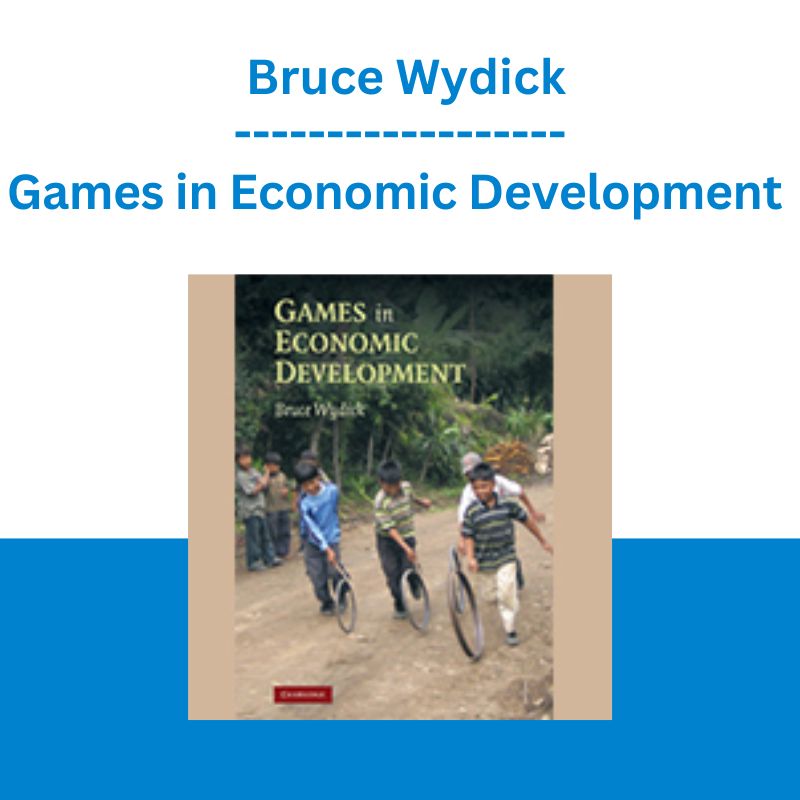*** Proof of Product ***
Exploring the Essential Features of “Games in Economic Development – Bruce Wydick”
Games in Economic Development examines the roots of poverty and prosperity through the lens of elementary game theory, illustrating how patterns of human interaction can lead to vicious cycles of poverty as well as virtuous cycles of prosperity. This book shows how both social norms and carefully designed institutions can help shape the ‘rules of the game’, making better outcomes in a game possible for everyone involved. The book is entertaining to read, it can be accessed with little background in development economics or game theory. Its chapters explore games in natural resource use; education; coping with risk; borrowing and lending; technology adoption; governance and corruption; civil conflict; international trade; and the importance of networks, religion, and identity, illustrating concepts with numerous anecdotes from recent world events. Comes complete with an appendix, explaining the basic ideas in game theory used in the book.
Reviews
‘Games in Economic Development presents a unified view of the difference between the rich countries and the third world. The rich countries have institutions that counteract many different co-ordination failures that plague the third world. Bruce Wydick explains those failures theoretically, and he illustrates them beautifully with many colorful and convincing examples. Some of these are from his own experience in Guatemala. Yes, this is what economic development is all about.’
George Akerlof – Nobel Laureate in Economics, 2000, University of California at Berkeley
‘Drawing from a voluminous literature, this book illustrates a number of important economic concepts with simple game theory examples. The tone is student-friendly, the presentation insightful and entertaining … an excellent companion to courses in the economics of development and institutional change, and relevant reading for development practitioners.’
Marcel Fafchamps – Oxford University
‘Game theory explains how rational, far-seeing individuals left to their own devices may fail to achieve social rationality. The emergence of game theory shifted the focus of development economics from relationships of production to relationships among people. Bruce Wydick’s book provides a lively introduction to the game-theoretic perspective on economic development. Telling examples explain why public school teachers in poor countries are so often absent, why deworming programs that could make everyone better off fail, why rational farmers may adopt the wrong technology, and how corruption becomes entrenched. A broad and up-to-date survey of patterns of interaction that contribute to the persistence of poverty or create an escape hatch.’
Karla Hoff – Senior Research Economist, The World Bank
Contents
- Frontmatter
- Contents
- List of Figures and Tables
- Preface
- 1 – Economic Development, Interdependence, and Incentives
- 2 – Games
- 3 – Development Traps and Coordination Games
- 4 – Rural Poverty, Development, and the Environment
- 5 – Risk, Solidarity Networks, and Reciprocity
- 6 – Understanding Agrarian Institutions
- 7 – Savings, Credit, and Microfinance
- 8 – Social Learning and Technology Adoption
- 9 – Property Rights, Governance, and Corruption
- 10 – Conflict, Violence, and Development
- 11 – Social Capital
- 12 – The Political Economy of Trade and Development
- Appendix
- Exercises for Interested Readers
- References
- Index
Please see the full list of alternative group-buy courses available here: https://lunacourse.com/shop/










 George Fontanills & Tom Gentile - Optionetics 6 DVD Series Home Study Course (Digital Download)
George Fontanills & Tom Gentile - Optionetics 6 DVD Series Home Study Course (Digital Download)  Jesse Livermore Trading System - Joe Marwood
Jesse Livermore Trading System - Joe Marwood  Team NFT Money - Ultimate NFT Playbook
Team NFT Money - Ultimate NFT Playbook  Ed Ponsi - Forex Trading
Ed Ponsi - Forex Trading  Toshko Raychev - Profit System + ITF Assistant
Toshko Raychev - Profit System + ITF Assistant  Money Miracle - George Angell - Use Other Peoples Money To Make You Rich
Money Miracle - George Angell - Use Other Peoples Money To Make You Rich  Molly Mahoney - Video Marketing Made Easy
Molly Mahoney - Video Marketing Made Easy  SMB - Options Training
SMB - Options Training  Alphashark - The AlphaShark SV-Scalper
Alphashark - The AlphaShark SV-Scalper  Greg Loehr - Advanced Option Trading With Broken Wing Butterflies
Greg Loehr - Advanced Option Trading With Broken Wing Butterflies  The Daily Traders – Exclusive Trading Mentorship Group
The Daily Traders – Exclusive Trading Mentorship Group  George Fontanills & Tom Gentile - Optionetics Wealth Without Worry Course
George Fontanills & Tom Gentile - Optionetics Wealth Without Worry Course  Oliver Velez - Essential Strategy Of Trade For Life
Oliver Velez - Essential Strategy Of Trade For Life  Dave Landry - Stock Selection Course
Dave Landry - Stock Selection Course  Akil Stokes & Jason Graystone - TierOneTrading - Trading Edge 2019
Akil Stokes & Jason Graystone - TierOneTrading - Trading Edge 2019  Erik Banks - Alternative Risk Transfer
Erik Banks - Alternative Risk Transfer  Matthew Kratter - Trader University
Matthew Kratter - Trader University  Crypto Dan - The Crypto Investing Blueprint To Financial Freedom By 2025
Crypto Dan - The Crypto Investing Blueprint To Financial Freedom By 2025  Emanuele Bonanni - My Trading Way
Emanuele Bonanni - My Trading Way